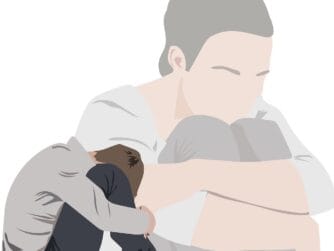Voice 1
Welcome to Spotlight. I’m Adam Navis.
Voice 2
And I’m Liz Waid. Spotlight uses a special English method of broadcasting. It is easier for people to understand, no matter where in the world they live.
Voice 1
Camila and Henrique were young and in love. But one day Camila discovered something surprising. Henrique had been born with the HIV virus, which attacks the body’s immune system. Many of their friends and family did not want Camila to stay with Henrique. But she remained in a relationship with him. Together they faced discrimination because of Henrique’s HIV positive status.
Voice 2
Thousands of people in Brazil and around the world watched this relationship. Camila and Henrique were characters on a Portuguese language television program in 2015. Malhação-Seu Lugar No Mundo is a well-known Brazilian TV program. Camila and Henrique were very popular characters. But they also addressed a very important issue in Brazil and around the world. Today’s Spotlight is on the latest global situation of HIV/AIDS. What is happening with this very important issue?
Voice 1
HIV/AIDS has been a major world issue since the 1980s. The World Health Organization says that since that time, more than 70 million people have been infected with HIV. About 35 million have died of HIV. Thirty years ago there was a lot of bad or false information about HIV/AIDS. But most people today know much more about the disease. They know that they cannot get HIV from just touching someone. The virus does not pass through sweat, saliva or urine. This improved information helps people react to the disease in a better way. So what is happening with HIV/AIDS in our world now?
Voice 2
There have been both positive and negative changes for HIV/AIDS. Here is the good news! The total number of people infected with HIV is going down. People know more about how to avoid HIV infection.
Voice 1
In some parts of the world, rates of HIV/AIDS have decreased a lot. For example, Sub-Saharan Africa has the highest rates of HIV/AIDS in the world. But in East and South African countries, the number of people with HIV/AIDS has gone down by nearly 30 percent since 2010. Botswana’s Health Minister Dorcas Makgato tells Al Jazeera how her country made this happen:
Voice 3
“Right from the beginning we decided to come to the issue boldly. We were very open about the size of the problem and did not try to hide from it. We were bold in the sense that we admitted that there was a problem. We were bold in bringing everyone involved together. We had a common purpose in fighting HIV and AIDS.”
Voice 2
Botswana still has a high rate of HIV at 21 percent. But this has dropped from 36 percent in the year 2000. Botswana has a government program that treats EVERY person no matter their age, sex or economic status. And they have seen particular improvement in one area: passing of HIV from mothers to their babies. The rate in Botswana has dropped from 40 to less than two percent! Many other countries have a similar drop in mother to child transmission. This is one of the major successes against the global HIV/AIDS epidemic.
Voice 1
Many people with HIV/AIDS are also living longer. People with HIV/AIDS can take drugs to control the virus. These drugs are called Antiretrovirals or ARVs. By using ARVs correctly, people with HIV/AIDS can live long, productive lives. UNAIDS is the United Nations’ global effort to end AIDS. In a report, they said that for the first time, 53 percent of the people who need ARVs are able to get them. This is more than twice the number of people who were able to get them in 2012.
Voice 2
But not all of the developments with HIV/AIDS are good. In some parts of world, cases of HIV/AIDS are even going up. NPR reports that new HIV infections in Eastern Europe and Central Asia have increased by 60 percent. Most of the cases of HIV/AIDs in countries like Russia and Ukraine are in particular parts of the population. HIV/AIDS is most commonly spread in this area by injecting illegal drugs.
Voice 1
But there are people at risk and vulnerable in every country, even wealthier ones. Some people have fewer resources and less social power. The most vulnerable people include women, migrant workers, sex workers and people living in conflict areas. Vulnerable people have less control over their own safety. They also have less access to HIV prevention, testing and treatment.
Voice 2
And even after 30 years, there is still lot of stigma around HIV/AIDS. People do not want to talk about it – it seems shameful. The issues around HIV/AIDS are very complex. This shows why the disease is so difficult to deal with. Michel Sidibé is the Executive Director of UNAIDS. He spoke to the Global HIV Prevention Coalition:
Voice 4
“We must boldly face the structural barriers and basic causes of vulnerabilities. This is what makes prevention so difficult. Unless we address the basic causes of new HIV/AIDS infections, no big change will come. If it was easy, we would have done it by now.”
Voice 1
So there are many challenges for people living with HIV/AIDS. But there is also a lot of hope for the future. Researchers continue working to find a cure for HIV/AIDS. We do not know when a cure will be available. But we do know that people living with HIV/AIDS are surviving later into life.
Voice 2
HIV/AIDS is a very real part of life in every country in the world. We are not all doctors, but everyone can work to fight HIV/AIDS. We can look for true information and share it with other people. You can find links to information on the script page of this program. People can also help decrease stigma. We can care for the people around us, no matter what their status is. As Michel Sidibé says:
Voice 4
“We need every single part of society to join us on this journey. We have a road map to show the way, and we know the barriers in our path. Discrimination that limits people’s access to life-saving information and medicines must be removed. These services belong to everyone, whoever they are, wherever they live, whoever they love.”
Voice 1
Do you have true information about HIV/AIDS? What can you do to help vulnerable people in your community? Tell us what you think. You can leave a comment on our website. Or email us at radio@radioenglish.net. You can also comment on our Facebook page at facebook.com/spotlightradio.
Voice 2
The writer of this programme was Rena Dam. The producer was Michio Ozaki. The voices you heard were from the United States. All quotes were adapted for this programme and voiced by Spotlight. You can hear this program again, and read it, on the internet at www.radioenglish.net. This programme is called “The History and Present Situation of HIV/AIDS”
Voice 1
Look for our listening app in the Google Play Store and in iTunes. We hope you can join us again for the next Spotlight program. Goodbye.
See the Advanced version of this program
Question:
Do you know the true facts about HIV and AIDS? What is one thing you do not know, but want to know?








Do you know the true facts about HIV and AIDS?
yes I know about this HIV and AIDS.
But I do not know anyone I know came to him the disease
I also know that this disease is scary.And the transmission of infection in it is frightening and from dirty places.
What is one thing you do not know, but want to know?
Which I do not know !! How did this virus come about, and is it made by humans !!
Ten years ago, I thought that HIV/AIDS was a dangerous disease at 100% because I didn’t had truth informations about it and how people can infected by this disease. So, after watching some videos on youtube and read some books, I learned more informations about HIV/ AIDS for sharing with my family, my friends and my community and save better our live. Thank you so much for this program.
I knew that HIV/AIDS is a virus,and the virus generly has attacted the human cells because it contain the receptor addapt with glycoprotein of virus .And when the virus enterd the cells ,it had started to multiplicate (transformation of ARN to ADN)
This disease was similar like a lepra in biblical times during the 1980’s. I felt nervous about it because of there were no cure and at the beginning was focused to people who have extra marital sexual relationships or pervert people with lot.of sexual partners and drug consumers . At my teen age I learned to discriminate people who got this disease by lack of information or wrong publicity in high schools and television news broadcasting. Now is different. But right now ,I am not very informed about this disease yet. I do not know if the HIV could be transmitted by a kiss and what can I do? to convince my girlfriend to take an exam to be secure if whether both could have the infection. I would like to know what do I have to do if I get the infection of HIV? What are the steps that I have to follow ? There is a very well known film called “Philadelphia” that treats this topic . Good job , nice topic. Greetings from Quito, Ecuador.
in my filed work i dell with many patient had HIV and AIDS , one think i want to share is some people thy not say had HIV
I am completely had true information about HIV because my father doctor in public health so he told me about this disease
actually, I don’t know the information about HIV/AIDS. when I hear this podcast , I realized that I have too little information about its. thanks spotlight
I don’t know more information about HIV/AIDS and no one around me is infected. But I know we should face this problem directly.
I know HIV disease don’t transmit by touching or sweat, but it maybe transmit by teeth clinics, blood transfusions, and sex unless use supplies to protect. Also, some people feel shameful about talk about it .In addition when someone infected HIV most people think about him or her badly. They suffer so much especially in not educated communities. I hope good future and safety for them . Finally, HIV it’s not stigma.
I don’t know any true facts about HIV and AIDS However I try to researsh for this the disease and also how to avoid it? I have one information for AiDS it spreads quickly so people must be carful and they don’t uses thier own purposes with others because this work cause this problems lead to suffer with this disease.
No.
Well, actually I do not want to know something from HIV/AIDS.